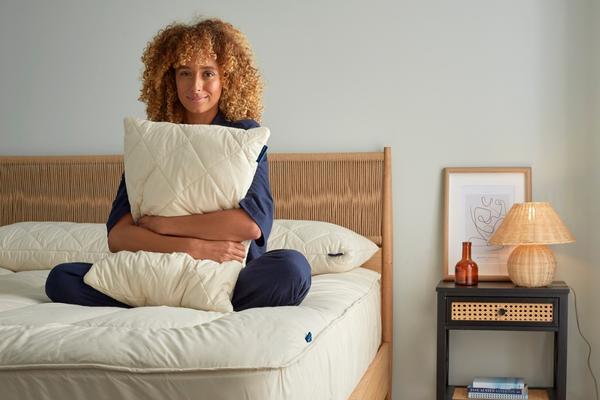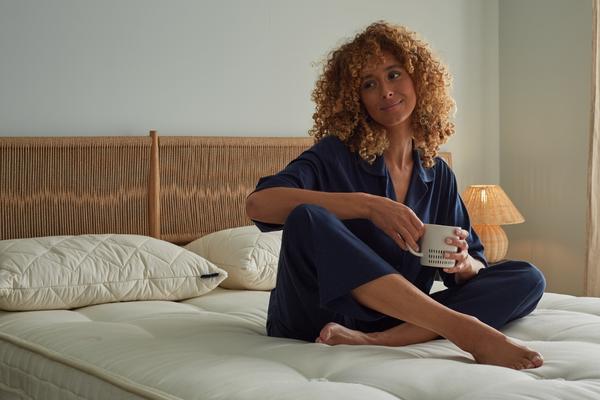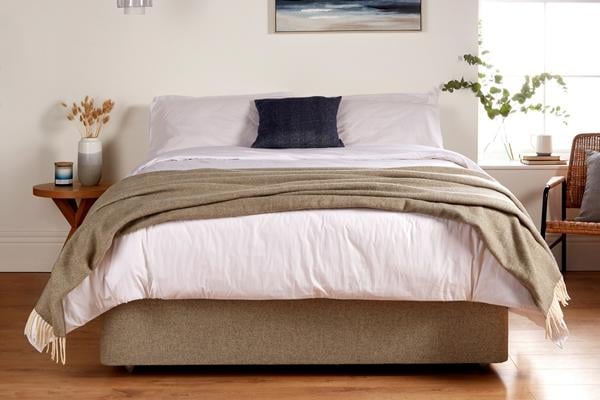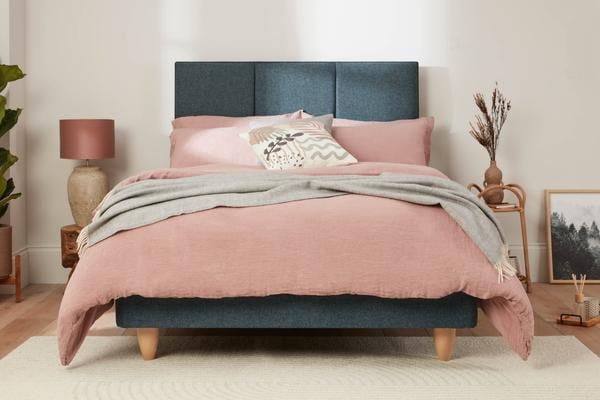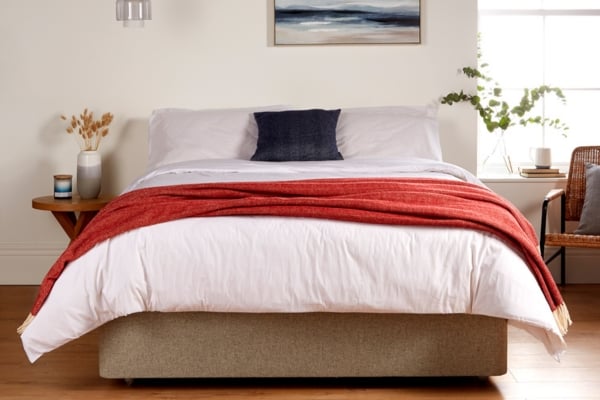A high body temperature can make restful sleep feel out of reach. Spending the whole night adjusting your sheets to cool down or waking up drenched in sweat can leave you feeling less than rejuvenated. If you’re wondering, “Why do I get hot when I sleep?” it often comes down to a mix of environmental and biological factors. Below, we’ll discuss some of these factors and offer advice for getting a cooler night’s sleep.
Why Is Your Body Temperature Too High?
Did you know that temperature fluctuations at night are completely normal? So, if high body temperature disrupts your sleep, you’re not alone. It’s linked to your body’s circadian rhythm — an internal clock that regulates your sleep cycle. As evening approaches, your core temperature naturally drops to help you fall asleep, then gradually rises in the morning to prepare you for waking. Some people, however, are more sensitive to these shifts, which can lead to waking up from overheating in the early hours.
How to Regulate Body Temperature
If you experience overheating at night or a high body temperature, the first thing you can do is understand the science behind the problem.
Your body’s temperature regulation is controlled by the hypothalamus, a small area at the base of your brain that works like a thermostat. It adjusts to keep your temperature close to 98.6°F. The hypothalamus releases chemicals and hormones and coordinates with other parts of your body responsible for temperature control, like your skin, sweat glands, and blood vessels. Together, they work to either cool you down or warm you up as needed to maintain a constant healthy temperature. This balance is achieved primarily through shivering and sweating.
Common Issues With Body Temperature Control
Sometimes, the hypothalamus struggles to regulate body temperature, which causes overheating at night. This can lead to uncomfortable sleep issues, such as restlessness and night sweats, making it difficult to get enough sleep. If you’ve ever wondered, “Why do I sleep hot?” or “Why am I so hot at night?” it could be your hypothalamus. However, other causes may also be to blame, which we’ll discuss below.
Diagnosing High Body Temperatures During Sleep
If you wake up feeling too hot, it may be because of how your body manages temperature during sleep. While some people sleep comfortably without temperature shifts, others are more prone to overheating at night because of natural body rhythms or specific physical triggers.
Try tracking your symptoms and noting when you feel the most discomfort or if external factors, like room temperature, influence how you sleep. Symptom tracking may help you narrow down the cause of your high sleep temperatures.

Reasons You Might Experience High Body Temperature When Sleeping
There may be more than one culprit behind your high body temperature at night. Here’s a look at common causes and how they can affect sleep.
Hormonal Changes
If you’re wondering, “Why do I get hot when I sleep?” your hormone levels may be the culprit. Hormonal changes can affect the way your body regulates its temperature. Fluctuations in hormones like progesterone, testosterone, and insulin can increase blood flow to the skin, making you feel warm when you sleep.
Room Temperature and Bedding
Your bedroom’s temperature and the bedding you use can greatly impact your nighttime sleep temperature; when the room is too warm, or you’re wrapped in heavy materials that trap heat, your body struggles to cool down.
Metabolic Rate
Our bodies need energy to burn food, which leads to an increase in body temperature. If your metabolism is exceptionally high, your body needs more energy to function, which can lead to a higher body temperature — even during sleep.
Stress and Anxiety
When dealing with high levels of stress or anxiety, the body may react with a higher heart rate and blood pressure, which can increase body temperature. This response is linked to the release of stress hormones like cortisol and adrenaline, which prepare our bodies for a “fight or flight” reaction. As a result, you might find yourself sleeping hot or experiencing night sweats.
Exercise
Physical activity is excellent for your health but can also raise your body temperature. As you exercise, your blood flow increases to provide oxygen and nutrients to your muscles and skin, causing a temperature spike. If you’ve ever asked, “Why does my body get so hot at night?” it could be due to the lingering effects of exercise since elevated heat levels may take time to cool down.
To avoid overheating at night, try to finish your workout at least two to three hours before bedtime. Doing this will give your body the chance to return to a comfortable temperature for sleep.
Diet and Alcohol
What you eat and drink can impact your body temperature as well. Eating spicy food, drinking alcohol, or consuming large meals close to bedtime can raise your body temperature. Try to eat lighter meals in the evening, avoid alcohol before bed, and consider foods that can cool your body, like leafy greens and fruit.
Mattress Temperature Regulation
Some mattresses absorb the heat your body releases, which can lead to overheating at night. If your mattress doesn’t have proper ventilation or cooling materials, the absorbed heat can create an insulating effect that raises your body temperature.
Being Sick and Having a Fever
When you’re sick, your body naturally raises its temperature to fight off infection, which can lead to sleeping hot. Fevers increase your core temperature as part of the immune response, which can make restful sleep challenging.

How to Solve Overheating at Night
Simple changes to your sleep environment and routine can make a big difference in keeping cool at night. Here are a few tips to help prevent sleeping hot.
Switch to Temperature-Regulating Bedding
Using breathable bedding materials like cotton and wool can reduce overheating at night by allowing air to circulate freely around you. Wool, in particular, offers moisture-wicking properties that control humidity, so you’re less likely to wake up feeling warm or clammy. It can also regulate temperature to adapt to your body’s needs throughout the night.
Stay Hydrated
It may sound simple, but staying hydrated is a great way to prevent overheating at night. When you’re well-hydrated, your body can release heat through sweat, leading to a cooler body temperature. Dehydration, however, reduces the volume of available sweat, making it difficult for your body to cool down.
Wear Light Clothes
Wearing lightweight, breathable clothes to bed can help you stay cool while you sleep. Light fabrics promote better air circulation around your skin, reducing the chances of sleeping hot. Wool sleepwear can be especially practical because it wicks moisture away and adjusts to your body’s temperature, keeping you cool and dry throughout the night. If you often ask, “Why do I sleep hot?” switching up your sleepwear could make a difference.
Turn the Thermostat Down or Use Fans
Lowering the room temperature before bedtime helps create a better sleep environment by supporting your body’s natural cooling process. Setting your thermostat between 68 and 72 degrees or using a fan can reduce overheating at night and improve sleep quality. Cooler air reduces excess body heat, so you don’t wake up sweating.
See a Doctor If the Problem Worsens
If you try these tips and are still sleeping hot or notice the issue worsening, we recommend speaking with your doctor. They can help identify underlying causes, such as hormone imbalances or other conditions, to bring relief and improve your sleep quality.

Wool Bedding
Breathable, natural, and temperature-regulating wool bedding offers a solution for those who frequently ask, “Why do I get hot when I sleep?” Wool manages heat and moisture levels to keep you cool throughout the night. Check out our options for wool bedding to sleep more comfortably.
Wool Mattresses
If overheating at night is a regular struggle, a wool mattress could be the answer to a better night’s sleep. Wool’s natural breathability helps keep your body cool and creates an environment that prevents heat buildup. Discover our collection of wool mattresses to find the right one for you.
Bed Linen
Our bed linen is made from natural fibers and can enhance sleep comfort. Unlike synthetic materials that trap heat, natural fibers help wick away moisture and allow better air circulation. Shop our bed linen options today!
Wool Blankets & Throws
Adding a wool blanket or throw to your bed can provide warmth without causing overheating. Wool blankets adapt to your body temperature, making them great for year-round use. Explore our range of wool blankets and throws to add the perfect one to your home.
The Bottom Line
If you’re tired of waking up hot and restless, try making a few of the changes above to get a better, cooler night's sleep. From adjusting your room temperature to choosing the right bedding, these tips make it easier to find relief and enjoy high-quality rest.


